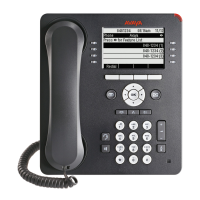9500 Series Telephone User Guide Page 163
Issue 12b (Wednesday, March 28, 2018)IP Office™ Platform 11.0
Comments on this document? infodev@avaya.com
Glossary: Logged Out
22.21 Logged Out
If you are logged out from any phone, you are treated as being busy to receiving any calls. Callers follow your forwarding
settings if set or go to voicemail if available.
22.22 Login Code
You can use a login code to log in at any phone on the telephone system and then use that phone as your own. While
logged in, you can use the phone's menus to set and change your login code.
22.23 Missed Call
Missed calls are calls that ring at your phone but are not answered. The system administrator can configure whether
missed calls should include calls that you did not answer but were answered for you by another user; for example, by a
user with a call coverage button set for your calls. If this mode is enabled, it will also include calls that were answered by
your voicemail.
22.24 Missed Group Call
The system administrator can configure whether the telephone system should keep an internal log of missed hunt group
calls. They can then also set which groups of which you are a member, should have their missed calls shown as part of
your missed calls call log. This does not require the group call to have been presented to you and missed.
22.25 Mobile Twinning
Mobile twinning allows your calls to ring at both your phone's and at another phone's number, which can include an
external number. If you have been configured as a mobile twinning user, you can switch the use of mobile twinning on or
off through the phone's menus and can also change the number to which you are twinned.
22.26 Network
Several telephone systems can be connected together to form a network. Depending on the type of IP Office you have
this may be called a Small Community Network (SCN), IP Office Server Edition network or IP Office Select network. In
such a network, you can dial the users and groups on other systems in the same way as for internal calls on your own
system. Essentially all the systems in the network act as one large system.
22.27 Park Call
Parking a call is similar to holding a call. However, parked calls can be retrieved by other users on the telephone system.
A call that you park and leave parked for too long will recall to your phone. The recall will ignore any 'do not disturb' and
forwarding settings, recalling to the phone from which it was parked.
22.28 Park Slot Number
If you park a call without specifying a park slot number, the system will assign a number based on your extension
number plus a single digit. For example for extension 201, the first parked call will use park slot number 2010 if
available. If you already have a parked call, the next parked call uses park slot 2011 if available and so on up to 2019.
Call park buttons can be configured to match specific park slot numbers. A call parked using that button is given that park
slot number. All users with a call park button set to the same number can see when there is a parked call there and can
unpark that call using their button.
22.29 Ringing Line Preference
If not connected to a call, when you receive an incoming call, ringing line preference automatically makes the alerting
appearance button your selected appearance button. This means that you can answer the call by simply lifting the
handset or pressing the Headset or Speaker button.
Without ringing line preference, to answer the call on the alerting appearance button you must first press that appearance
button to select it.
22.30 Short Codes
Short codes are numbers that you can dial to enable and disable various features. The following are default short codes
that may be available. However, your system administrator can remove and change the short codes available to you or all
users. To use a short code, you may have to put your currently call on hold.

